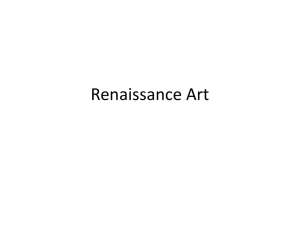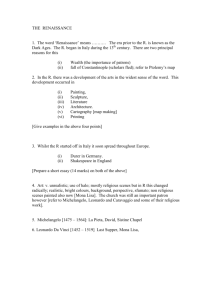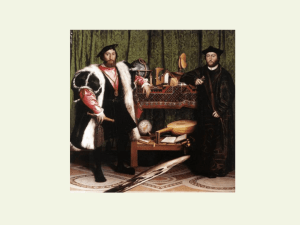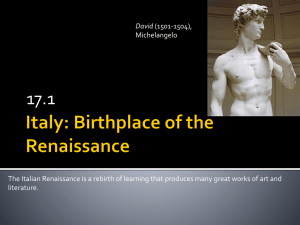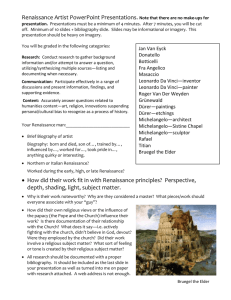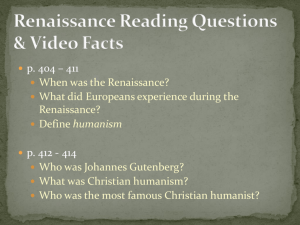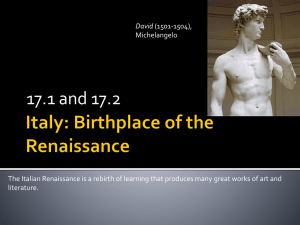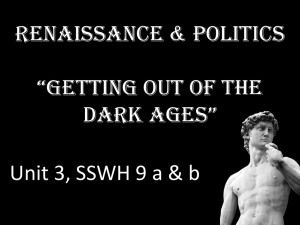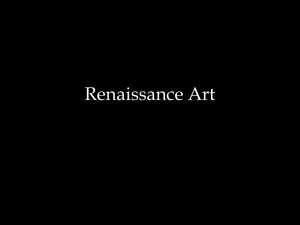Arts Appreciation
advertisement
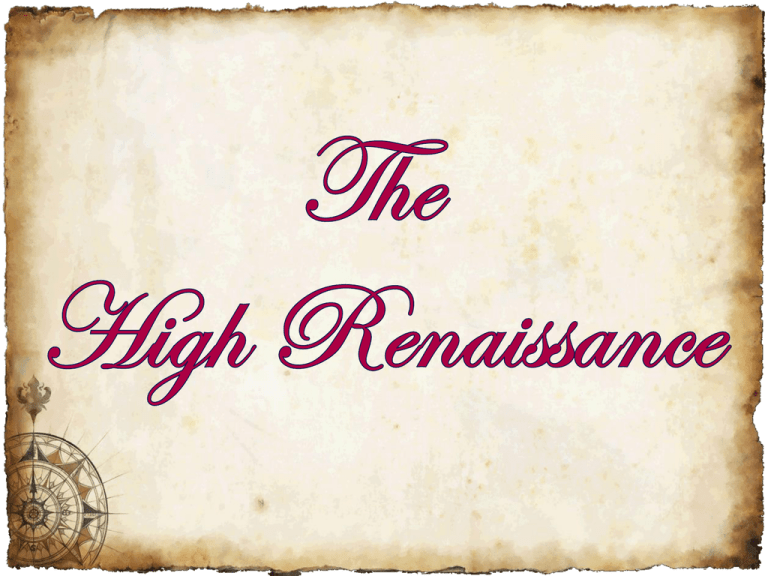
~ High Renaissance masters lots of the freshness and charming naivete which had been hallmarks of early struggles. • Recognize the achievements of individual artists of the High Renaissance. • Explore the development of sculpture and architecture. • Examine the classical and expressive developments in architecture during the High Renaissance. Painting In sixteenth-century paintings there are fewer figures , and they express abstract qualities rather that individualized emotion. Leonardo da Vinci (1451-1519) ~ Born in a small town of Vinci near Florence ~ First Studied in Milan ~ Super master of line, Pioneer of Sfumato (“Smokey”) , inventor, naturalist, and painter of the soul’s intent . Leonardo DaVinci, Mona Lisa (1503 -1505) Oil on Wood Atmospheric Perspective (Background is duller and lighter) – “Sfumato” Symbol of Western Art (most recognized painting) Mystery (Who is she? Why is she smiling? Painting Cropped in Size Oil on Wood RETOUCHED VERSION: Leonardo da Vinci, The Last Supper, c. 1495-1498, Tempera Wall Mural, Santa Maria della Grazie, Milan “One of you shall betray me” DaVinci experimented with different techniques for painting on wall (not fresco) Triangle Composition in Center One Point/Linear Perspective Synthesis of 15th Artistic Developments -Perspective -Light and Dark -Triangle Composition -Realistic Anatomy of Humans Leonardo da Vinci Virgin and Child with St. Anne and the Infant St. John 1505-1507 Drawing (Charcoal and white chalk on brown paper) Raffaello Sanzio da Urbino simply known as ”Raphael” (1483 – 1520) ~ Trained in Umbria by Perugino (Christ Delivering the Keys the Kingdom to Saint Peter) ~ Young master moved to Rome; influenced by Bramante ~ Absorbed elements of the work of Leonardo and Michelangelo to create his own unique style ~ Talented, popular, and beloved artist who died young (entombed in the Pantheon) 13 RAPHAEL, Philosophy (School of Athens), Stanza della Segnatura, Vatican Palace, Rome, Italy, 1509–1511. Fresco, 19’ x 27’. 16 RAPHAEL SANZIO: Sistine Madonna. Gallery, Dresden. (15131514) Oil on canvas. 104 x 77in (265x196cm) Gemäldegalerie Alte Meister, Dresden. Michelangelo di Lodovico Buonarroti Simoni commonly known as ”Michelangelo” (1475-1564) ~ Study Michelangelo’s Pieta and its significant features ~ Examine the formal references to classical antiquity in Michelangelo’s David. ~ Examine Michelangelo’s humanistic interpretation of the Sistine Chapel ceiling paintings, especially in the Creation of Adam. ~ Realize the popularity and longevity of Michelangelo resulted in his involvement in many other projects often simultaneously ~ Notice differences in the mature work of Michelangelo Holy Family Sistine Chapel (exterior) Sistine Chapel, constructed from (1477-1480), Vatican City, Rome (Interior) Sistine Chapel, constructed from 1477-1480, Vatican City, Rome (Ceiling) Michelangelo, Creation of Adam, 1508-1512, Fresco (4th center panel from the entrance), Sistine Chapel, Vatican Venetian Painters • Grounding their art in the senses, they appealed to the eye and the spirit through brilliant color, glowing light, and the beauties of nature. • Long ties with Byzantium had left a lingering preference for gold mosaics and icon like images of the Virgin • Its wealthy and independent citizens were well able to indulge their love of oriental luxuries. • The most decorative element is color Giovanni Bellini (1430-1516) • Who was the first painter to attempt harmony through the use of color. Giorgione (1478-1511) • Who might be called the inventor of Italian genre painting. Theme of Peacefulness / Tranquility References to Poetry / Literature / Humanism • Shepherd symbolizes the poet • Pipes and Lute (musical instruments) symbolize poems • Two women are “muses” for inspiration GIORGIONE: The Open Air Concert. Louvre, Paris Tiziano Vecelli or Tiziano Vecellio known in English as ”Titian” (1477-1576) ~ The most versatile of Italian painters ~ Equally adept with portraits, landscape backgrounds, and mythological and religious subjects. ~ Titian had softly textured, rich material In his work. Reference to Classical Roman Mythology Venus – Roman Goddess of Love and Beauty Symbol of Beauty Color used to organize the composition (Red in foreground and in skirt in background) – Titian, Venus of Urbino, 1538, Oil on Canvas Diagonal Movement Sculpture and Architecture Made his first reputation as a sculptor and always called himself a sculptor Two pieces of sculptor best represent his High Renaissance St. Peter The High Renaissance characterized by the grandeur and monumentality of the Roman DONATO D’ANGELO BRAMANTE (1444-1514) -Was a greatest architect, although few of his buildings survive . - innovative central-plan designs based on classical sources (influence of Roman circular temples), and the beginning of new St. Peter’s in Rome Tempietto DONATO D’ANGELO BRAMANTE, plan for the new Saint Peter’s, the Vatican, Rome, Italy, 1505. (1) dome, (2) apse. 31 MICHELANGELO BUONARROTI, plan for Saint Peter’s, Vatican City, Rome,Italy, 1546. (1) dome, (2) apse, (3) portico Villa d’Este at Tivolli Music The calm, ethereal beauty of the a cappella style of polyphony in the High Renaissance is the crowning achievement of some six hundred years of effort by Countless musicians in England, France, The Low Countries and Italy The Two Chief Forms of Church Music 1. Motet 2. Mass Orlande de Lassus Composer Roland de Lassus was a Netherlandish or Franco-Flemish composer of the late Renaissance. He is today considered to be the chief representative of the mature polyphonic style of the Franco-Flemish school, and one of the three most famous and influential musicians in Europe at the end of the 16th century (the other two being Palestrina and Victoria). Born: 1532, Mons, Belgium Died: June 14, 1594, Munich, Germany Albums: La Quinta essentia (Huelgas Ensemble, conductor: Paul van Nevel) Literature Two prose works of the High Renaissance should be knopwn to every educated person who is interested in government and the arts Effects of the Italian Renaissance on the West Western Europe and England were slow to feel the effects of the Renaissance for the number of reasons. French was busy for a hundred years trying to expel the English from French soil. Another reason was a Gothic Spirits with all of its Manifestation Robert L. Delovoy of the Institute of Art And Archeology, Brussels, Thinks that Burgundians used an Imaginary vertical line through the center f the picture toward which pairs of lines on all levels would coverage Ghent Altar Piece Claus Sluter (born 1340s in Haarlem died in 1405 or 1406, Dijon) was a sculptor of Dutch origin. He was the most important northern European sculptor of his age and is considered a pioneer of the "northern realism" of the Early Netherlandish painting that came into full flower with the work of Jan van Eyck and others in the next generation. Statue of Moses The Mérode Altarpiece is a triptych by the Early Netherlandish painter Robert Campin, although believed by some to be by a follower, probably copying an original by Campin. It is currently described by the Metropolitan as by "Robert Campin and assistant". It was created after 1422, likely between 1425 and 1428. As arguably the finest Early Netherlandish work in New York, and in North America after the Washington Van Eyck Annunciation was acquired in 1939, it has become Campin's best known work, helped by the undoubted charm of the domestic setting and townscape outside the windows. ENGLAND The Renaissance ushered in England's Golden Ages of Music and Literature Henry VIII Elizabeth I Poetry And Playwrights Sir Philip Sydney(1554-1586) – wrote his pastoral Areadia and penned Sonnet To Penelope Devereaux. Edmund Spenser (15521599) was a gifted poet and had a fine classical education. He labored for twenty years on the Faerie Queene, in which he tried to combine elements of Homer, Vigil, Ariosto, and Tasso. MUSIC. Someone has said that England in this period resembled a nest of signing birds, an apt these birds also played instrument. William Bryd (15421623). He composed the noblest and most devotional church music. Thomas Morely (15571603). Composed beautiful madrigals. Orlando Gibbons (1583-1625). Composed all kinds of keyboard music, and there are dozens Elizabethan composers. In 1603 was published a collection of twenty-nine madrigals, called The Triumphs of Oriana.
